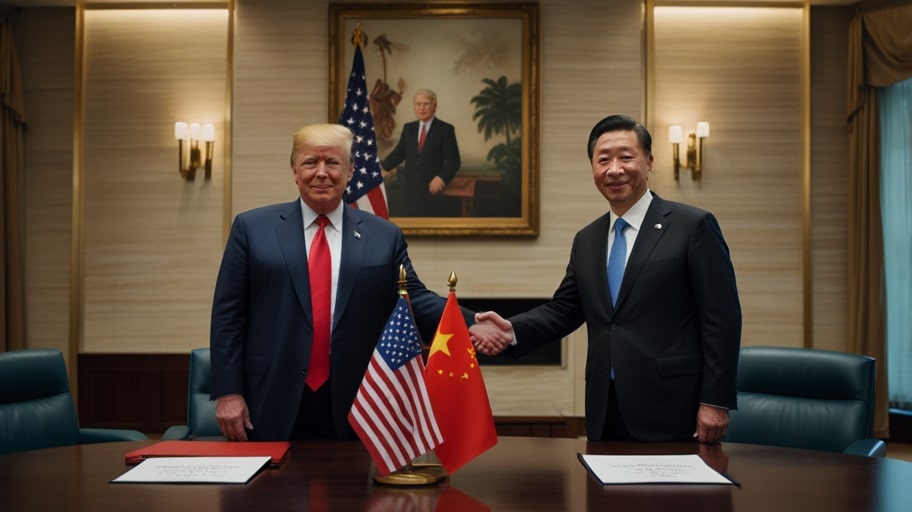On June 12, 2025, business analyst Shaun Rein lifted the veils off President Donald Trump’s dramatic declaration that the U.S.-China trade war was a done deal. His remarks create a vivid contrast between Trump’s wording and the brittle existence of the agreement.
Proclamation of the Done Deal
Global markets were shaken when Trump declared that the US had reached an agreement on a trade deal with China. Addressing Washington, he boasted of a system that would cut tariffs and rare-earth mineral exports. The agreement, he argued, would bring back stability and create opportunities for American businesses, especially those in education and technology.
The Skeptical Lens of Rein
Shaun Rein, a long-time expert on China, cautions us. He claims that Trump’s story is simplistic on a very intricate and combustible accord. Although the agreement provides a temporary relief by lowering tariffs on Chinese products that were earlier at 145 percent to 30 percent, Rein cautions that it is a temporary ceasefire and not a long-term solution. The source of the tensions has not been addressed adequately, jeopardizing future derailments.
Tariffs and Temporary Relief
On June 9, the deal was brokered in London, where the U.S. Treasury Secretary Scott Bessent and Chinese Vice Premier He Lifeng shook hands. Tariffs were greatly reduced, providing temporary relief to consumers. Nevertheless, Rein mentions that the 55 percent tariff on Chinese commodities continues to weigh down on American families, increasing their expenses.
Rare-Earth Minerals under Threat
One of the deal’s points includes China restarting the export of rare-earth minerals, which are essential to electric vehicles and technology sectors. Trump has claimed this as a win, but Rein doubts how sustainable it will be. China’s near-monopoly on these minerals places Beijing in a position of strength, which could increase the U.S.’s negotiation power in subsequent negotiations.
Economic Implications in the spotlight
International economic outlooks are depressing. Recently, the World Bank reduced its growth estimate to 2.3 percent in 2025 due to uncertainty caused by tariffs. Reinel (Rein) seconds this, stating that Trump’s aggressive trade policies can lead to job losses and an increase in consumer prices, and Yale University estimates an extra cost of $2,800 a year to each household.
The Chinese Point of View
To Beijing, the deal is a strategic timeout. Even after the truce on May 12, exports of China to the U.S. fell by 34.5 percent in May. Rein speculates that the Chinese leaders are engaged in a long-term game, where they are using their economic resilience to deal with Trump, whose tariff threats are unpredictable.
Trump’s Domestic Narrative
Back home, Trump has a deal that enhances his brand as a dealmaker. His working-class supporters are excited by the prospect of a renewed American manufacturing. However, Rein claims that this story is a cover for reality. The concessions made in the deal, such as admitting Chinese students into American colleges, elicit controversy on matters relating to national security and economic equality.
Influence of Decision Makers
The U.S. negotiators, led by Commerce Secretary Howard Lutnick, sought to relax restrictions on exports. Rein interprets this as a realistic step to ensure mineral supplies but cautions that it will reduce U.S. leverage. In the meantime, He Lifeng of China indicated his willingness to continue the negotiations, pointing to a possible lengthy negotiation process.
Market Reactions and Volatility
Tech and consumer stocks were boosted, and Wall Street initially jumped on the news of the deal. But Rein warns that this optimism is short-lived. Investors are also still nervous because they know that on or before July 9, when the 90-day truce period is over, Trump can revert to his tariff threats, which will derail markets.
Trade Wars History
Trump’s trade policy replicates the first term, which was characterized by dramatic threats and incomplete solutions. This was the same case in the 2018-2020 trade war, where interim agreements broke down under pressure. Rein creates parallels, stating that Trump’s ongoing policy focuses more on short-term victories than long-term stability, which could lead to global economic collapse.
Inflation on the Consumer Costs
American consumers do not get much immediate relief in the deal. Rein points out a study by Yale, which forecasted 456,000 job losses by the end of the year as a result of remaining tariffs. Inflation is already an issue that may rise higher, straining household finances and putting Trump’s economic pledges to the test.
Geopolitical Ramifications
The deal has geopolitical significance besides economic relevance. Rein observes that China’s dominance in rare earth elements enhances its international power, whereas Trump’s tariff obsession serves to estrange allies such as the European Union. The postponement of the EU tariffs to July 9 indicates bad relations, which makes U.S. foreign policy difficult.
The 2nd Reality Words
Rein’s argument is that Trump’s “done deal” is more rhetoric than substance. As much as the agreement is a plus, it is not lasting. Devoid of structural concerns such as intellectual property theft and market access, Rein is of the view that the trade war will continue and be masked by temporary truces.
Looking Ahead
With the development of the 90-day truce, Rein suggests that stakeholders should prepare to expect anything. The deadline set by Trump on July 9 approaches, and unilateral tariff increases may be made. Companies have to operate in this instability and should be hopeful and careful. An analysis by Rein highlights the disparity between what Trump said and the weak basis of the trade deal.
A Cry of Clarification
Finally, Rein appeals to an open conversation. Although politically powerful, the Trump story risks confusing markets and consumers. An honest appraisal of the deal’s boundaries would create realistic expectations, drawing policymakers onto a path of long-term solutions. Contrary to Trump’s victorious statements, the shadow of the trade war looms large until then.
